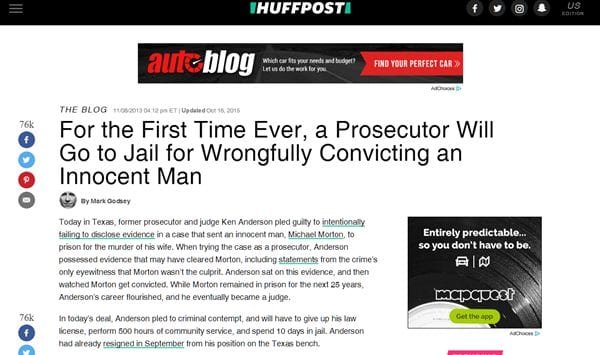 Today in Texas, former prosecutor and judge Ken Anderson pled guilty to intentionally failing to disclose evidence in a case that sent an innocent man, Michael Morton, to prison for the murder of his wife. When trying the case as a prosecutor, Anderson possessed evidence that may have cleared Morton, including statements from the crime’s only eyewitness that Morton wasn’t the culprit. Anderson sat on this evidence, and then watched Morton get convicted. While Morton remained in prison for the next 25 years, Anderson’s career flourished, and he eventually became a judge.
Today in Texas, former prosecutor and judge Ken Anderson pled guilty to intentionally failing to disclose evidence in a case that sent an innocent man, Michael Morton, to prison for the murder of his wife. When trying the case as a prosecutor, Anderson possessed evidence that may have cleared Morton, including statements from the crime’s only eyewitness that Morton wasn’t the culprit. Anderson sat on this evidence, and then watched Morton get convicted. While Morton remained in prison for the next 25 years, Anderson’s career flourished, and he eventually became a judge.
In today’s deal, Anderson pled to criminal contempt, and will have to give up his law license, perform 500 hours of community service, and spend 10 days in jail. Anderson had already resigned in September from his position on the Texas bench.
What makes today’s plea newsworthy is not that Anderson engaged in misconduct that sent an innocent man to prison. Indeed, while most prosecutors and police officers are ethical and take their constitutional obligations seriously, government misconduct—including disclosure breaches known as Brady violations—occurs so frequently that it has become one of the chief causes of wrongful conviction.
What’s newsworthy and novel about today’s plea is that a prosecutor was actually punished in a meaningful way for his transgressions.
I give speeches about the Innocence Movement, and tell stories from real cases, all around the world. No matter where I am, when I finish speaking the first question usually is, “What happened to the police/prosecutors who did this to the poor guy?” The answer is almost always, “Nothing,” or worse, “The police officer was promoted and now is the chief of his department.” The adage that the powerful go unpunished is no truer or more visible than with police officers and prosecutors in America—even when they send innocent people to prison from their misconduct.
My client Roger Dean Gillispie of Dayton, Ohio, for example, spent 20 years in prison as a result of police misconduct. In 2007, we presented overwhelming evidence that the police officers, like Anderson in the Morton case, failed to turn over evidence to the defense before trial that would have cleared Gillispie. We also supplied the court with evidence that the police officer in charge had harassed and intimidated witnesses helpful to the defense, and had manipulated the evidence. Before going to court to clear Gillispie, we met with the local prosecutors, hopeful that they wouldn’t tolerate such misconduct and would do a thorough (and neutral) investigation to get to the truth. Instead, they simply denied everything in knee-jerk fashion, and fought to keep Gillispie in prison until a federal court finally found government misconduct and threw out his charges in December 2011. To this day, the police officer in the case has not been investigated by a neutral, independent body. The only thing he has received is promotions.Read more.. By Mark Godsey

